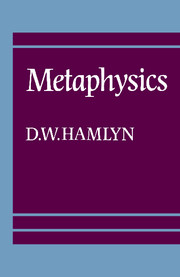9 - Persons and personal identity
Published online by Cambridge University Press: 05 June 2012
Summary
Persons and selves
Contemporary philosophical discussions concerning persons centre largely on the criteria of personal identity. Questions about the criteria of identity for Xs are, however, correlative with questions about the kind of concept that the concept of X is. It is the nature of a given thing which determines the sort of circumstances in which it is appropriate to speak of one thing of that kind being identical with what is putatively another. John Locke, who is to all intents and purposes the originator of our modern problems about personal identity raises those problems in the course of a chapter of his Essay Concerning Human Understanding (2.27) which is concerned with identity and diversity in general, and there is a sense in which he was quite right to do so. For personal identity does not raise problems distinct from those concerning identity in general unless there is something special about the concept of a person which brings that about.
I say that Locke is to all intents and purposes the originator of our modern problems about personal identity. Mediaeval philosophers were of course concerned with the problem of the principle of individuation, as we saw in Chapter 4, and in confronting the question of what ultimately distinguishes two things or two things of a certain kind they presumed certain answers to questions about the identity of those things. That included questions about human beings and about the soul.
- Type
- Chapter
- Information
- Metaphysics , pp. 187 - 218Publisher: Cambridge University PressPrint publication year: 1984



